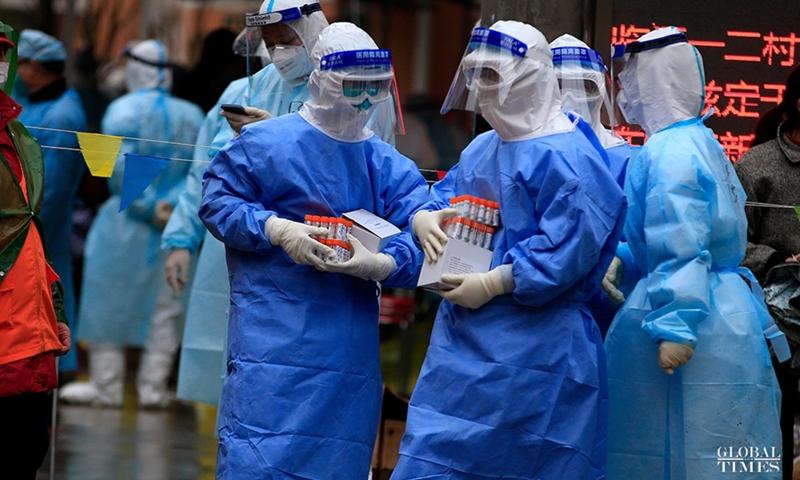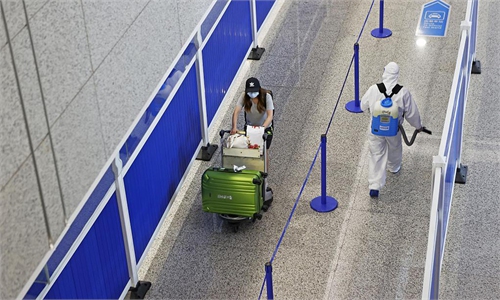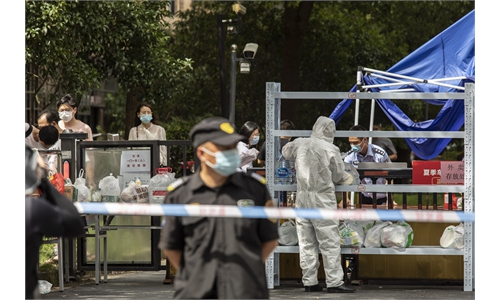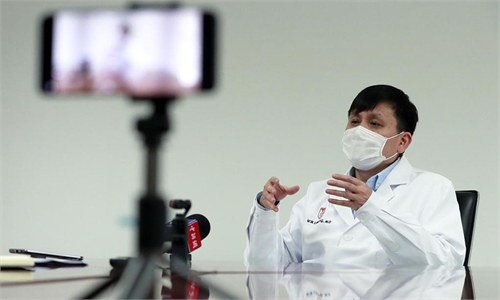
Medical workers give residents in Shanghai nucleic acid tests. Photo:Yang Hui/GT
Shanghai reported three new local COVID-19 cases on Thursday, almost three months after the city's last local infection was confirmed on August 26.
All the three confirmed patients are women in their 30s who had traveled together to Suzhou, East China's Jiangsu Province between November 19 and 21. So far, they have been transferred to a designated hospital for treatment and they are in a stable condition, Wu Jinglei, director of the Shanghai Health Commission announced during the press briefing.
Notably, all three have had both doses of vaccine.
Two compounds in Pudong New Area and a compound in Qingpu district where the three patients live or stayed temporarily have been designated as medium-risk areas.
As of 5 pm on Thursday, 27 close contacts of the patients have been traced and all of them have been placed under centralized quarantine. Among these close contacts, 16 have tested negative for COVID-19 and the other test results have not yet come out.
Meanwhile, 29 samples collected from the related items and environment among a total of 972 samples have tested positive for COVID-19.
Ruijin Hospital affiliated to Shanghai Jiao Tong University, Zhongshan Hospital affiliated to Fudan University, Central Hospital of Minhang District, Tongji Hospital of Tongji University suspended their outpatient and emergency services on Thursday to carry out related personnel and environmental screening.
According to Zhang Wenhong, a leading infectious disease expert in Shanghai, all the three infections were identified in time and were placed under quarantine with the screening and epidemiological investigation being carried out simultaneously.
China has accumulated sufficient experience in terms of the dynamic zero-case policy, and the rapid response and accurate prevention strategy won't change in the battle against this COVID-19 flare-up in Shanghai, Zhang noted during a press briefing by the Shanghai health authority on Thursday.
This flare-up will serve as an example of how to contain the epidemic in the shortest period and with the least influence on residents during the autumn and winter season, Zhang noted.
Zhang suggested that if residents have fever or influenza symptoms after they travel to other places, they should immediately go to hospital and take a nucleic acid test, which would be a huge support for the city's epidemic prevention work.
Meanwhile, an asymptomatic infection case was reported in Hangzhou, East China's Zhejiang Province on Thursday.
The person infected was a faculty member at the Zhejiang University Museum of Art and Archaeology who had close contact with the cases reported in Shanghai, while traveling in Suzhou on November 20.
Zijingang Campus of the university was placed under closed-loop management on Thursday to swiftly cut the transmission chain and all kinds of education activities have been moved online.
All the students and faculties are taking nucleic acid tests and the close contacts have been placed in quarantine.
The Shanghai Municipal Administration of Culture and Tourism suspended trans-provincial group tourism and reservation services for plane tickets and hotels on Thursday in order to further strengthen epidemic prevention efforts.
A "circuit break" mechanism will be implemented in trans-provincial tourism when medium- or high-risk areas appear in the city.
Global Times



